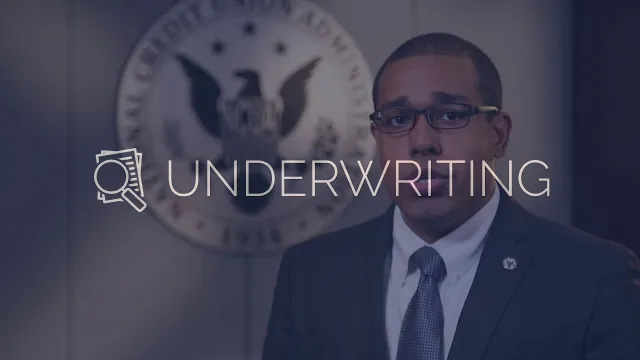Getting and Maintaining a Mortgage
Mortgage Shopping
Buying a home is an exciting time when you get to shop around for a house that suits your needs and dreams. However, most people don’t have hundreds of thousands of dollars saved to buy their home outright, so they need a mortgage loan to make their purchase. But did you know that you should shop around for a mortgage just like you shop for the right home? Comparison shopping gives you the power to make the best decision for you and allows you to explore what different lenders have to offer. Always get quotes from your credit union, bank, and other financial institutions to see who can provide the best rates and terms for you.
What is a Mortgage?
A mortgage is a loan used to purchase a home or other real estate. The borrower agrees to pay the lender over time, typically in a series of regular payments divided into principal and interest. The property serves as collateral to secure the loan.
You must apply for a mortgage through your bank or credit union and meet several requirements, including minimum credit scores and down payments. You will likely be charged mortgage loan origination fees by the lender for processing a loan, often expressed as a percentage of the loan amount. Some lenders require 20% of the home’s purchase price as a down payment. However, many lenders now offer loans that require less than 20% down — sometimes as little as 5% on conventional loans. If your down payment is less than 20%, lenders usually require you to purchase private mortgage insurance (PMI) to protect the lender in case you fail to pay.
Features of a Mortgage
Mortgages can have many different features. Interest rates can be fixed or adjustable. A fixed rate will remain the same through the life of the loan whereas an adjustable rate will have lower rates at the start and may increase as the rate changes. Mortgages with interest-only payments are set for a specific period and will not reduce the principal of the loan. You may receive penalties for paying the loan off early (federal credit unions are prohibited from charging prepayment penalties), and a large payment due at the end of the loan (a balloon payment).
Types of Mortgages
Most home loans are conventional mortgages. They’re issued by banks and credit unions, and often sold to government-backed entities like Fannie Mae and Freddie Mac with loan limits set by the Federal Housing Finance Administration (FHFA). While a conventional loan is the most common mortgage, it can be difficult to get. Borrowers need to have a high credit score (over 600) and also need to be able to afford a down payment of 20% or more or pay for private mortgage insurance (PMI).
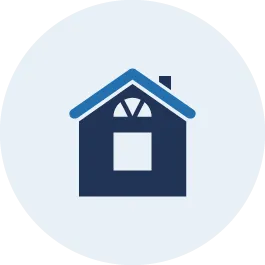
ARMs are home loans whose rates can vary over the life of the loan. Unlike a fixed-rate mortgage, which carries the same interest rate over the entirety of the loan term, ARMs start with a rate that’s fixed for a few years, and then adjust and increase over time. Your loan terms and the market will determine that adjustment period. ARMs often have a lower initial interest rate than fixed-rate mortgages. This option could be helpful to you if you don’t plan to stay in your home for long or plan to have more money in the future to cover the increased monthly payments. However, ARMs can be complicated to understand and may not offer many benefits when rates are overall low.
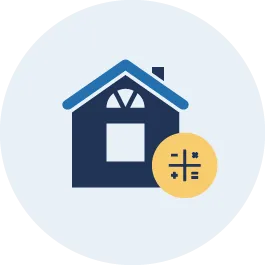
Fixed-rate mortgages are one of the most common types of real estate loans. Every fixed-rate mortgage has a set interest rate, a set payment schedule and a set term, which is usually between 10 and 30 years. A fixed-rate mortgage is ideal when interest rates are low, you plan to be in the same home for many years or want to have consistent payments throughout the loan period.
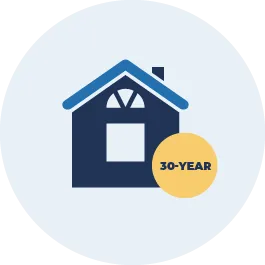
A government-backed mortgage is a loan offered to eligible individuals by traditional private lenders, like a bank or credit union, but insured by one of three federal government agencies: the Federal Housing Administration (FHA), the U.S. Department of Agriculture (USDA) or the Department of Veterans Affairs (VA). This backing reduces risk for lenders so they can be more lenient with credit scores and down payments.
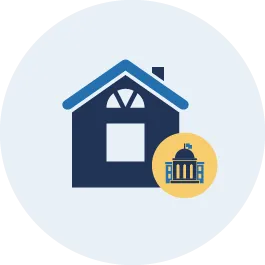
If you’re buying a luxury home, you’ll likely be looking at a jumbo mortgage to cover the cost. A jumbo loan is more than the lending limits set by the FHFA. Since they’re not guaranteed by any of the government-sponsored entities, lenders treat these larger mortgages as riskier. The qualification guidelines are often stricter. You should have credit scores in the 700 range and 20 – 30% of the total cost as a down payment when applying for a jumbo loan.
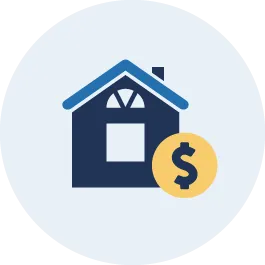
A reverse mortgage is a special type of loan that allows you to convert part of the equity in your home into cash without having to sell your home. In a reverse mortgage, you receive money from the lender, and generally don’t have to pay it back for as long as you live in your home. The loan is repaid when you die, sell your home, or when your home is no longer your primary residence. The proceeds of a reverse mortgage generally are tax-free, and many reverse mortgages have no income restrictions.
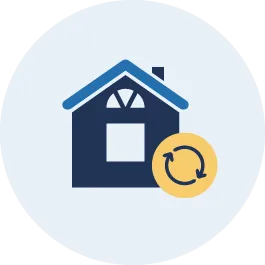
Refinancing
If you already have a mortgage, refinancing may lower your interest rate. The interest rate on your mortgage determines how much you pay on your mortgage each month – lower rates usually mean lower payments. You may be able to get a lower rate because of changes in the market conditions or because your credit score has improved. A lower interest rate may allow you to build equity in your home more quickly. If you have an adjustable-rate mortgage, or ARM, your monthly payments will change as the interest rate changes. With this kind of mortgage, your payments could increase or decrease.
If you have an adjustable-rate mortgage, or ARM, your monthly payments will change as the interest rate changes. With this kind of mortgage, your payments could increase or decrease. You may find yourself uncomfortable with the prospect that your mortgage payments could go up. In this case, you may want to consider switching to a fixed-rate mortgage when refinancing to give yourself some peace of mind by having a steady interest rate and monthly payment. You also might prefer a fixed-rate mortgage if you think interest rates will be increasing in the future. However, the monthly savings gained from lower monthly payments may not exceed the costs of refinancing. If you are planning to move in the near future, determine whether it is worth it to refinance. Closing costs and other fees may not make refinancing a good option for you.
Mortgage Modifications
Mortgage loan modification may be a good alternative if you’re ineligible to refinance or you’re facing a long-term hardship causing you to be several months behind on your mortgage payments. Modifying your mortgage will immediately resolve the delinquency status with your mortgage company. It may reduce your monthly payments to a more affordable amount, or permanently change the original terms of your mortgage, giving you a fresh start. Loan modification is less damaging to your credit score than a foreclosure. You can stay in your home and avoid foreclosure. Under this option, you reach an agreement with your mortgage company to change the original terms of your mortgage—such as payment amount, length of loan, interest rate, etc. In most cases, when your mortgage is modified, you can reduce your monthly payment to a more affordable amount.
Equal Credit Opportunity Act
The Equal Credit Opportunity Act (ECOA) makes it illegal for a creditor to discriminate in any aspect of a credit transaction. The ECOA prohibits discrimination based on:
- Sex
- Race or color
- Religion
- National origin
- Marital status
- Age
- Receipt of income from public assistance
- Exercising, in good faith, any right under the Consumer Credit Protection Act
Frequently Asked Questions
Pros of Obtaining a Reverse Mortgage include the following.
- Supplemental Income – Reverse mortgages can provide tax-free income, which can help cover living expenses, medical bills, or other costs during retirement.
- Stay in Your Home – You can continue living in your home without making monthly mortgage payments, allowing you to age in place.
- No Monthly Payments – Unlike traditional loans, you don’t have to make monthly payments. The loan is repaid when you sell the home, move out, or pass away.
- Non-Recourse Loan – If the loan balance exceeds the home’s value, you or your heirs are not responsible for the difference if the home is sold for the appraised fair market value. The lender can only claim the home’s value.
- Flexible Payment Options – You can choose to receive the funds as a lump sum, monthly payments, a line of credit or a combination of these.
High Costs – Reverse mortgages can come with high upfront costs, including origination fees, closing costs, and mortgage insurance premiums. Reduced Home Equity – As you receive payments, your home equity decreases, which can limit the inheritance you leave to your heirs. Ongoing Expenses – You are still responsible for property taxes, homeowners’ insurance, and maintenance. Failure to keep up with these can lead to foreclosure. Impact on Benefits – Receiving reverse mortgage payments can affect eligibility for certain need-based government benefits, such as Medicaid. Complexity – Reverse mortgage can be complex and difficult to understand, requiring careful consideration and possibly professional advice.
No. Title XI of the Financial Institutions Reform, Recovery, and Enforcement Act of 1989 (Title XI) generally requires credit unions to obtain appraisals for real estate-related transactions regulated by the NCUA. In 2020, the NCUA amended its regulations to require credit unions to obtain appraisals when originating residential real estate loans of $400,000 or more. Loans for less than $400,000 generally require written estimates of market value instead of appraisals. While written estimates of market value do not have to be issued by state-licensed or -certified appraisers, they must still be issued by individuals with qualifications and experience to perform such estimates.
Under Title XI of the Financial Institutions Reform, Recovery, and Enforcement Act of 1989, the Appraiser Qualifications Board (AQB) establishes the minimum education, experience, and examination requirements for real property appraisers to obtain a state license or certification. The AQB issues the Real Property Appraiser Qualification Criteria.
Appraisal discrimination is illegal under federal law and prohibited by professional appraisal standards. The Fair Housing Act and the Equal Credit Opportunity Act prohibit appraisers from discriminating against you. If you think you have been discriminated against, you can file a complaint with the state agency that regulates appraisers. To find out which agency to notify, contact the Appraisal Complaint National Hotline. The hotline doesn't handle complaints but will refer you to the appropriate authority. You may fill out a form on the website or call the toll-free number at 877-739-0096.
You may also file a complaint with a state or federal financial regulatory agency if you think your lender discriminated against you by relying on a biased appraisal. To submit a complaint against your credit union, please contact the NCUA’s Consumer Assistance Center or call 800-755-1030. You may also contact the Consumer Financial Protection Bureau at https://www.consumerfinance.gov/complaint/ or call 855-411-2372.
You may also file a fair housing complaint directly with HUD's Office of Fair Housing and Equal Opportunity, online at https://www.hud.gov/program_offices/fair_housing_equal_opp/online-complaint or by calling 800-669-9777.
